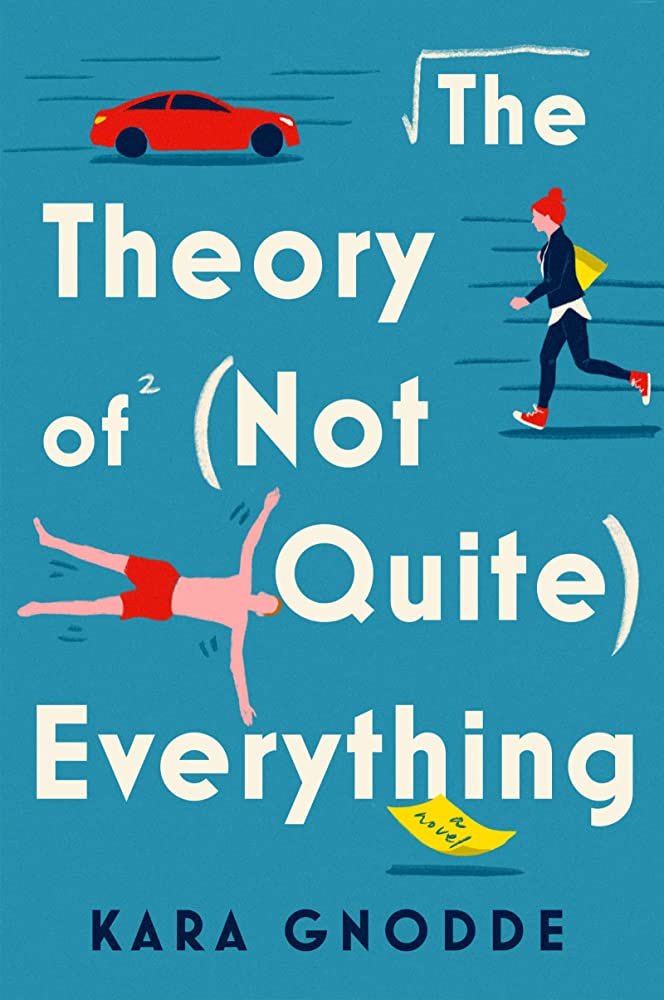The Theory of (Not Quite) Everything
“It’s the Halting Problem. All outcomes are possible until one outcome actually happens. Until you know for sure, you don’t know anything.”
While the cover may lead you to believe this is a silly romcom, The Theory of (Not Quite) Everything is actually a deeply profound, emotional novel about love in all its forms––from siblings, to best friends, to romantic partners. Kara Gnodde's debut is a stunning example of sacrifice, family, empowerment, and of course, math.
Summary:
Orphaned as young adults, siblings Art and Mimi Brotherton only have each other to rely on. Art, a mathematical genius and professor, relies on Mimi to make his meals, do his laundry, and provide him with routine. Mimi, a sound designer for movies and TV, relies on Art as her last familial connection. Devoted housemates and caregivers, the two have lived their lives side-by-side since their parents passed a decade ago, and if it were up to Art, they would happily remain so until the bitter end. However, Mimi has other plans. Nearing thirty, Mimi has decided it's time for her to find a romantic partner to settle down with. Despite dreams of meet-cutes and whirlwind romances, Mimi knows her brother's mathematical prowess will be able to find her a suitable boyfriend in no time. And, if Art has a hand in her relationship, Mimi secretly hopes it will be easier for him to let her go.
Sure enough, Art develops the perfect code for Mimi to find a boyfriend using a dating website. Yet, when Mimi meets another mathematician at one of Art's awards ceremonies and hits it off, she quickly abandons the formula to pursue Frank, a quirky, romantic, stargazer who seems head-over-heels for Mimi. Because Frank is in the math community, Mimi feels compelled to keep her last name a secret, fearing he would have preconceived notions attached to the Brotherton name, or worse, would want to get close to her because of her father and brother's famous proof, the Millennium problem: p versus Np, which Art has dedicated his life to solving. But the longer her and Frank are together, the more Mimi realizes she can trust him not only with herself, but with Art.
Yet when Frank and Art meet, Art immediately distrusts the other man in Mimi's life. Already chronically paranoid, Art becomes convinced that Frank is also pursuing p versus Np, and goes out of his way to sabotage Mimi and Frank's relationship, unintentionally straining his own relationship with Mimi in the process. As the tensions grow between all parties, Mimi realizes she needs to make a choice: a life taking care of her brother with no chance of love, or a loving life with Frank without her brother's approval.
Everything comes to a breaking point when Art is hit by a car and hospitalized in critical condition. Suddenly Mimi is reliving her parents' deaths all over again, fixating on their unfortunate demise as she waits at her brother's bedside, unsure of who to trust, who to love, and who to believe. Will Mimi be able to choose her own future? Or will Art and Frank's rivalry choose it for her?
Thoughts:
The Theory of (Not Quite) Everything is one of the most thought-provoking books I've read in a long time. I saw a lot of my own brothers in Mimi and Art's characters, which made this an even more heartbreaking read, but I also just saw a lot of myself in Mimi with her uncertainty for her future. In her education, career, and love life, Mimi never felt fully onboard with her decisions, and as a college senior about to graduate, I definitely relate to Mimi's constant questioning of her choices in life.
In regards to the writing, Kara Gnodde's debut was captivating. Gnodde managed to write about highly theoretical mathematics without sounding boring or condescending––a feat few can manage––but she also was able to weave math into the theme and message of her story so effortlessly. The idea of the Halting Problem, which is referenced in the pull-quote, is really the problem of life, the true theory of not quite everything: will any input, or choice, halt at one point, or will it run for infinity? Will our outcomes forever be impacted by our choices, or do we ever get the chance to start again? With any job entered, any relationship begun, the halting problem is at stake. Will you get fired (a halt), or will you stay at one job until retirement? Will you break up, or will your love last until death? Gnodde's interwoven math theories do more than just prove Art's genius; they inspire the reader to think about life deeply and theoretically.
I truly loved everything about this novel. From the mystery established in chapter one with t=0 at Art's car accident, to the slow build of Mimi and Frank's love story starting at t=a year prior, to the puzzle of their parents' death at t=13 years ago, Gnodde masterfully kept me on the edge of my seat waiting for reveals while simultaneously sunk deep into my bed, reveling in her good story telling.
Overall:
The Theory of (Not Quite) Everything was one of those books that made me sit silently staring into space for five minutes after finishing because I needed to process. A beautiful blend of literary fiction, romance, mystery, and women's fiction, Gnodde exemplified what it means to write about true love beyond the bounds of courtship. I cannot wait to read everything Kara Gnodde ever writes.
I highly recommend this book to anyone, but especially those looking to be introspective, philosophical, and blown away.
My Rating: 5/5
Goodreads Average: 3.61/5
Information:
The Theory of (Not Quite) Everything by Kara Gnodde (HarperCollins)
Publication Date: February 28, 2023
ISBN: 9780063266018

